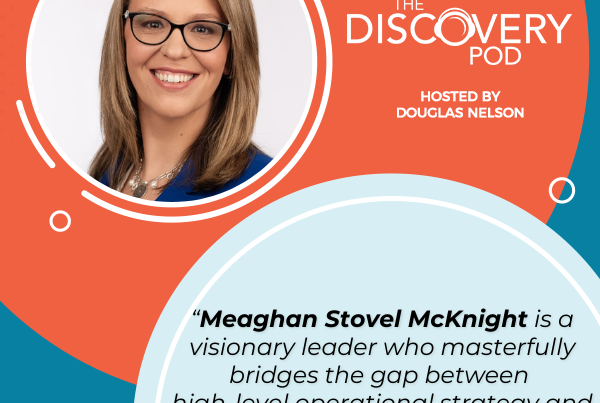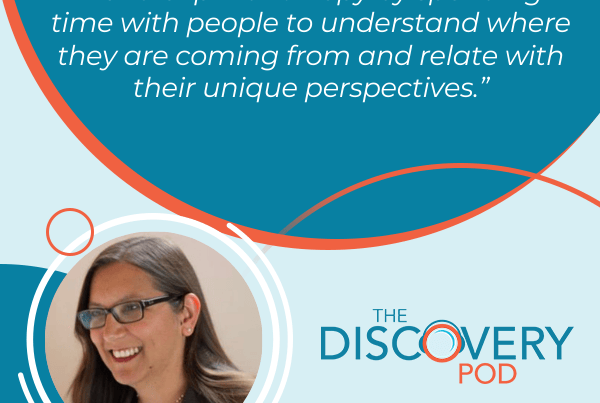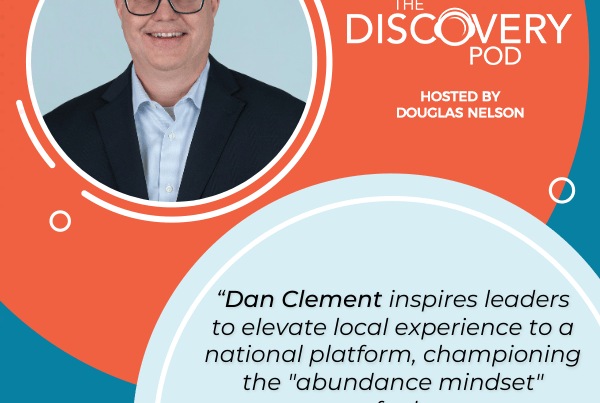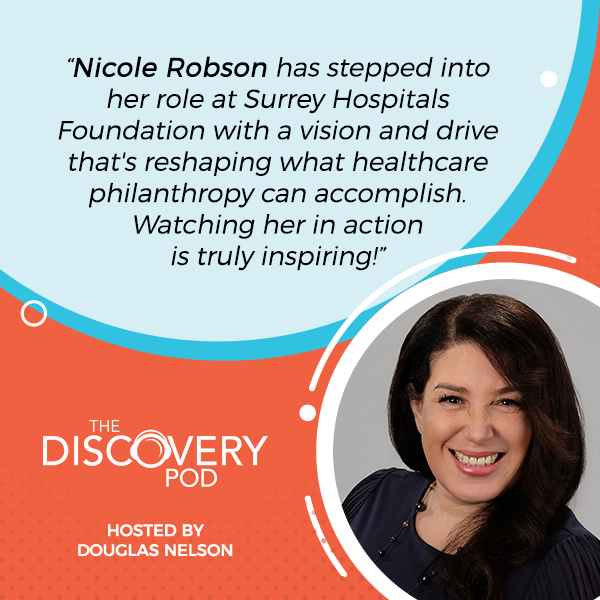
In this episode, host Douglas Nelson welcomes Nicole Robson, President & CEO of the Surrey Hospitals Foundation, to discuss her journey in healthcare philanthropy and her mission to support the thriving Surrey community. Just seven months into her role, Nicole shares her vision for addressing critical healthcare needs in one of Canada’s most diverse and rapidly growing cities. Learn how Nicole and her team are inspiring the community to invest in a future of excellence, bridging gaps, and ensuring every donation, big or small, makes a lasting impact.
—
Listen to the podcast here
Surrey Hospitals Foundation With Nicole Robson, President & CEO
Welcome to the show, conversations with social profit leaders. In our episode, we have Nicole Robson. Nicole is the CEO of Surrey Hospitals Foundation in Surrey, British Columbia. In our conversation, she talks about what it is to be a new CEO in a very important organization in a dynamic healthcare environment. How she approached the leadership challenge as a first-time CEO, and how she’s working with her team to build a dynamic force for healthcare philanthropy south of the Fraser River. A new leader with a bold vision. You’re going to want to listen to this great conversation with Nicole Robson.
_
Nicole, welcome to the show.
Thank you for having me. It’s an honor to be here.
It is great to have you on. I think a lot of us in the sector have watched your arrival at Surrey Hospital Foundation with some awe at the speed with which you’ve been moving in that organization. I thought it’d be great to have you on the show. We have a number of listeners who aren’t in British Columbia. Maybe you could take a few minutes to talk a little bit about your foundation and who you serve and how you’re approaching that just seven months into the job.
One of the things that really attracted me to this foundation is its history of building, I think outside of what people have as expectations, but also all the opportunities that I had were on track to be the largest city in BC by 2020 on. We’re one of the most diverse cities I would say in BC. With that is a lot of opportunity. We have many facilities under our foundation outside of this 18-making campus that I am sitting on. I think to know this hospital is to know we deal with births and end of life. What we find in support to our foundation is a myriad of things and facilities that address a lot of our current healthcare challenges that I think we’re facing in Canada and globally.
You mentioned the diversity of the city and I think it really is. If I recall, the statistics are 45% of the population of Surrey is newcomers to Canada versus a national average of about 23%. Quite a significant difference there. Vibrant, growing, great place to be.
Entrepreneurial, giving, kind. It’s an incredible community and investable.
As the hospital foundation for the whole community, how do you approach having conversations with so many different people and introducing healthcare philanthropy to people who maybe haven’t had that experience before?
Now, I would say one of the biggest challenges to these large pods is health there, like poverty, is often creating space for people to see themselves as part of this solution. Healthcare feels like such a large thing to move a needle on, whether it’s supporting a new facility or buying a piece of equipment or even just not understanding health. I think it’s really important that we create space for everyone to contribute on whatever we really can, but also to have them know the impact that has politically. Nothing is done alone. That’s the case for everything, whether it’s giving and philanthropy, whether it’s building a team and an organization, nothing is achieved by itself. Everyone has a part to play.
Government Funding Vs. Philanthropy
I really like that perspective of the community coming together to provide that margin of excellence. One of the big questions that I’m sure you’ve heard throughout your career and you’ve heard there in your new role is shouldn’t the government be paying for this? How do you make that make the case for that margin of excellence that comes through philanthropy when you when you’re hearing donors say, “Shouldn’t the government pay for this?”

Surrey Hospitals Foundation: When a community rallies together, extraordinary change happens. Philanthropy unites us all toward a common goal.
We all have a responsibility in that of this government but I don’t think anyone in the isolation and be the solution. I would say trying to balance the taxes we pay and where that’s invested. We completely recognize that it all funnels back down to us. I think this is where philanthropy plays a big role in helping people target those areas that are most important to them. The government cannot do everything. That’s just the reality. We all have to be partners in what we want our communities in our world to be. Again, we all have a responsibility to contribute in some way to the program. It can look different, as you know. Maybe it’s volunteering time, knowledge, and money. It can look so different, but it’s all valuable. It helps.
Government can't do everything; philanthropy fills the gaps and empowers communities to shape the future they want to see. Share on XBefore you were in your current role, you worked with JDRF. A very successful fundraising organization doing great work. I would imagine the donors to the Juvenile Diabetes Research Foundation are motivated by a specific cause by type 1 diabetes and everybody’s in it for that one single purpose. A unique marketing challenge or a fundraising challenge to show how you can make a difference in that condition. Now as head of an acute care hospital system, it’s a much broader message. How are you finding the differences in the conversations you’re having with donors?
Again, it’s just helping people understand where they align and what their role is, what they care about. Is it mental health? Is it acute care? Is it health? What is it that you have concerns about that you want to support? What area of excellence matters most to you that there’s a need in all of them at varying degrees? I think it’s just understanding. People give to people. As we get to know each other, understanding what’s important to you is what’s most important to me, because I want you to feel good in what you’re investing in.
Fundraising isn't just about the money; it's about matching each donor’s passion with a need, creating lasting impacts along the way. Share on XI think it’s an investment. It doesn’t have to be $5 million to be an investment. If it’s $5 and that $5 means a lot to you, I have a responsibility to invest it in a way that is not HG. I think it makes a difference moving on that we can be a part of the solution. It’s no different than anything else. It’s really just a gap, helping people think out and coming alongside them to do that.
Meeting them where they are and giving them the opportunity to benefit the community in a way that’s meaningful to them. It’s so simple when we break it down like this. How does healthcare philanthropy get so complicated?
It’s navigating the systems. I think what’s always intrigued me is we’re operating in systems that we built before the current developments. We have this interesting challenge of how do we help the system catch up. If it cannot catch up, how can we help programs or services bridge the gap? We’re always trying to find a solution. I think the answers, much like coming to a pandemic, aren’t going to come from one place. That’s where all of us coming together collectively help bridge that. The important role of the foundation is to be that conduit and to listen and connect people so that those solutions can move forward.
Prioritizing Diverse Healthcare Needs
One of the things that’s really unique about your foundation is that it serves the whole community of Surrey, not just the Surrey Memorial site, which is the largest acute care hospital in Surrey. You’ve got a new community hospital being built, a new tower there at Surrey Memorial Foundation. As well as all of the other projects, equipment, and capital needs that would normally be coming across your desk. How are you balancing the needs or the opportunities that you have to raise money across such a diverse field of activities?
I think having such a large population in a city already because all these rooms exist, and these facilities exist. I would say we serve self with the Fraser as a region. Again, we have regional programs that are leading the way out of this site. We’re not just here for the city of Surrey. We’re here for everybody and I think that’s an important thing to understand because that helps us understand where all of that alignment comes together. Does that make sense?
Yeah. That’s great. I think it also speaks to the diversity of the projects you’re raising money for both geographically and across the spectrum of healthcare in a lot of ways reflects the diversity and just the sheer growth that’s happening in the community that you serve. When you have the list as long as you do, how do you start with one if someone? If a donor comes to you and says, “Nicole what’s your top priority?” What do you say?
I go to my parkers. I go to the facility I go to the health authority. There are so many things that have to align to move something forward. You have to trust in the experts to know, can we meet those needs. It’s really interesting. We could build a space, but is there this staff? You could put the people in the rooms, but are there tray lines to feed them when they’re staying in our care? There’s so much more to the solution than often you think. In order for us to be responsible, we need to do that research to make sure what we’re moving forward has the opportunity to start right away, start making that impact.
What was your top priority?
Everything. Honestly, I think my top priority right now being here and with full transparency is to help people understand how proud they should be about what they need with this. We’re leading in so many areas in this city and this hospital across these sites. The Breast Health Clinic at the Jim Pattison Health Patient and Surgery Center is renowned. It’s incredible. It’s where I got sent when I needed to have a biopsy and was concerned about what was going to be next in my future. My mom had cancer care here at Surrey Memorial Hospital. I think we have a lot to be proud of. We have a lot of work to do, but we’re building on a lot of excellence in place already. To me, what that shows is that we’re ready for that responsibility as a facility, as a human.
Learning As A New CEO
This is your first CEO role, very successful in the sector prior to this. I’m curious what surprised you the most about stepping into the CEO role. What was different than what you might have expected it to be?
Renewable surprises me. If I’m going to be fully transparent, I think if you go in thinking you know everything, you’re going to set yourself up to fail. Everywhere needs a different part of you or maybe to show up in a different way as a leader. I’ve always been incredibly proud and honored to be a leader. I think that’s a huge role of privilege. I think we have a lot of responsibility regardless of what the level is, a manager, or a CEO.
We all have a responsibility as leaders, we influence people for the majority of their time, the majority of their life. That has a huge honor to it because we get to really help create positive spaces, driving change, people in non-profits are here to survive and be their friends. I think what an honor to come to work with a bunch of like-minded people every day. We just want to make the world a little better than they found it.
If you could go reach all the way back to your first day and give yourself a message, what do you wish you knew then that now?
I wouldn’t want to know anything. I wouldn’t want to come in with any biases, like in true honesty. I think I’m always trying to unpack my own unconscious bias in situations because I think that stops you from coming in with your eyes wide open and asking questions. There’s a superpower in being new and not understanding how everything was built because you’re looking at it differently and you come with more innovation and you listen better. We ask questions, we tend to listen on it. That allows us to bring the best out of what it is and also see needs that maybe people who’ve been there a long time don’t see.
One of the things I found when I made the move earlier in my career into certainly my first experience as being a CEO, was that I was used to being with colleagues, having colleagues in the organization to talk with and share things about, share things with. And, and, and then when you’re the CEO, it’s instinctive for most of us, but not everyone. You cannot complain about your team to your board or vice versa and not even complain. You cannot even wonder or worry out loud in many of those situations. When you’re having a tough day, who do you go to for advice and support?
I have an incredible group of people around from family to friends. I’ve worked with a lot of leaders of respect, but I would also say, no, I’m very transparent in my leadership. There isn’t anyone to go and complain about because I have those conversations in real-time, the difficult conversations. We have an environment here where people can speak up and you can show up as a full cell. What I would say is I bring my executive team into being a part of the solution. You need that. You need to have a successor at some point. You need to have understanding and everyone needs to be in the same boat. It doesn’t feel as isolating to me as I heard it could be. I would say the bigger challenge is defining what CEO you want to be.
It’s a really interesting point. One of the things that I sometimes lament, but certainly I guess benefited from, there are so many opportunities in our sectors to learn from the negative example. When I grow up and get to manage a team, I’m not going to be like so and so, or I’m not going to do that. If I’m concerned about the performance of the team, I’m never going to act like that boss I had. There’s a lot of learning through the errors of others that come with learning in our sector. How do you approach that learning yourself and talk to yourself about the kind of CEO that you want to be?
For me, I take leadership as you can tell very seriously. I’m that nerd who drives to work for listening to a podcast on leadership and looking to glean insights or perspectives. When I go on vacation, I bring my five leadership books with me. I’m always trying to better myself and give access to people to those aha moments when I have to listen and ask questions. I’m not afraid to not have all the answers. I think that allows me to seek help differently.
We know we’re not supposed to have all the answers. We know being a leader having diversity of thought and opinions is part of what makes us most successful. Having space for your employees to contribute makes us more successful. For me, I would say I’m a permanent learner. I don’t think I’m ever going to feel like I’m the best leader I can be. I think being a leader also means being good because different things are needed at different times and that includes knowing when somebody else has to take in charge.
Diversity in voices builds strength. Bringing different perspectives leads to better solutions, especially in healthcare. Share on XIt’s interesting you mentioned that I think particularly about that need to be right because I think that gets in the way of some leaders in our sector. We’ll name names when we stop recording, but there are some folks where being right is really important and where ego is a big driver of leadership. There’s actually a lot of benefit that comes from that for organizations and for themselves. Of course, some downsides follow along pretty quickly. One of the things I think that fundraisers bring to the role of CEO intuitively is the sense that you’re not going to know all the information.
Particularly those of us who spend time raising money in healthcare. Families or individuals who have a condition or are concerned about a condition, they know a lot of the details. They do the research, and they’re really up on it, particularly those who are thinking about making philanthropic gifts. They’ve thought about what they’re going to do. They’ve had deep conversations. They’ve read a lot about the conditions. They’re not expecting the fundraiser to know the answer. There are probably some exceptions to that.
For the most part, they’re not expecting the funds but they are expecting the fundraiser to play a role in guiding them to being able to make the impact that they want to have. They may have ideas about that that are well formed, or they may be specific, but not quite right. It’s often our fundraising, with our fundraising hats on to guide them and support them through that journey to make a gift. Being comfortable with getting the right answer, but not needing to be right, is what makes a successful fundraiser. I also think it makes a really successful CEO so I’m not surprised to hear that ethos reflected in your description of your own leadership.
I was listening to you nodding along because I agree with everything you’re saying. You answered your own question almost more eloquently than I did. Again, I think it’s showing up differently to the need of where you are. That doesn’t happen if you don’t listen. I’m humble enough to know I cannot do it alone. All those voices to your point, even if it’s not right, or the questions or the directions or advice, there’s always something to learn from it. That perspective is coming from a place that you don’t see. You can always dig deeper and say, “Why is this person asking us? What is the gap? How can we help.” The next person isn’t missing that piece.
Again, just reflecting on what being a fundraiser in healthcare gives you as a leader our little kinship that we’ve got going about that together, we’re often in the place of handling the experience of donors or their families and loved ones or people that care about them. A lot of philanthropy comes from things that haven’t gone well or the system didn’t get it quite right or not quite in time, and people are trying to fix something.
Much of our messaging in healthcare and fundraising is around providing a margin of excellence, taking what is good, and making it better. Often what’s motivating our donors is something that didn’t work for them, and fixing it so that it doesn’t let someone else down in the way that it let them down. The messages can be difficult to balance sometimes, but when they come together, it works out really well.

Surrey Hospitals Foundation: In healthcare philanthropy, it’s about enhancing what’s good and fixing what didn’t work—for a better tomorrow.
I’ve been here seven months, but I’m incredibly fortunate in that I’ve already witnessed the gratitude actually that takes place in Zambia. I think a lot of our giving is spurred by people who have been cared for well here, and who want to make sure that that also moves forward. You’re right. There are some people who recognize there’s a gap, and we want to solution it for the next. There are also people who’ve experienced excellence and they want to ensure that that continues as well. I would say there are always two sides to the coin and our job is to be here for a while.
That’s why it’s important to listen. I heard someone say on a podcast recently.
I don’t know what podcast that was, but it must have been great.
Great new CEO. One of the things we talked about, is who’s reading to the show as we’re getting started, one of the things with long-serving CEOs sometimes the feedback we get is the team doesn’t listen to it. When we have a new CEO or a relatively new CEO, everybody on the team listens to it. I want to give you a chance to send some messages out to the team through this. The question I want to ask you is, you’ve talked a lot about the importance of your team, the diversity of voices, and wanting a shared accountability for the success of the organization. What can a member of your team do to earn a gold star?
Show up every day and just do their best. That’s all we can ask of people is to show up and show up authentically. I’m going to say that my team currently in place, it’s largely a team, that is passionate and believes in the vision of where we’re going. I think that’s really important. I also want to acknowledge the team that brought us here. We’re standing on their shoulders. They dealt with different challenges and they’re the pathway for this.
I would also say thank you to them because we’re always charting a new way forward especially in healthcare, as we know. I think it’s important to acknowledge for both. As you said, we learn from all sides of things. You get the privilege of seeing what was successful, how did they unite people? How did they share a need? You also have the beauty of this new group and this new team coming in who has different ideas or who’s asking why are we doing it this way. Again, I think being open to hearing that is key.
Show up, bring your best self, listen, contribute. Those will work. That’s worth a gold star, I’d say.
There’s a lot of posters with that stuff on it. Be accountable, be transparent but those cultures are difficult. I think that’s what they don’t say is it’s hard to show up and be the full self. It’s hard to give space for people to bring their whole self to work. It’s hard to have a bunch of opinions all the time when you want to move quickly on something. It causes me to pause and think but I think it’s important. I think we all know that the rewards of that are worth it. Having people who are committed to doing that is very important.
One of the really great strengths of the leadership style you’re describing is that it builds deep trust over time, that people feel supported and more comfortable being their whole selves, committing themselves to work, raising their hand when they need help, less terrified, even okay with making a mistake, taking risks and making a mistake. One of the hardest parts of that style of leadership is getting people to believe it right out of the gate. The style seems very authentic to you. You’re like, “We want to find the right answer. Don’t worry about it. We’re going to crack some eggs and make some omelets. Folks, we got this.”
Fail forward.
I believe you when you say it and I’m sure your team believes you, but if they’ve not been in an environment that has that support, they haven’t been in a culture that supports that style of working, it can be hard for people to fully lean into it. How do you start to build that trust? How do you build that momentum towards that fail-forward environment?
Building Trust Through Vulnerability
I’m going to talk about the pandemic again, not because I’m triggered, but because it was a great opportunity of learning for me as a leader and as a person. We’re all resilient, but we all need to be heard. Again, it’s about creating space for those things. Being consistent, being transparent, and exhibiting it yourself, even when it’s difficult. Being a vulnerable leader is hard. Again it sounds great. Lots of books. Very difficult to lock the lock and then not always without repercussion, but you have to believe in what you’re doing and believe in people.
I think being open to constantly having those conversations and for that energy into it, people thrive, and their families thrive. It makes a difference because people take what they experience at work home and your team, regardless of their role or your ambassadors. They all represent the foundation, the cause, what we’re doing. Again, they’re all here because they want to make a difference. You have to figure out how to create that space and build that trust and just to come through consistency.
How do you remind yourself to take that half beat or even that full beat pause to make space for that consideration, make space for your team as they’re coming along with you? In an environment that is evolving rapidly and I’m sure your email, you probably have 300 emails when we get off of this recording. How do you remind yourself not to just make the decision or push the button on your own?
I remember the times I didn’t. I’m not perfect. I have a 29-year-old who will remind me consistently that I’m not perfect. I think putting the team around you who will tell you to take a beat in those moments, whether you are the CEO or not, I think is important not having all those yes people, which is what this environment does actually support people who are going to challenge you and say, “Maybe we should step back for a moment and you can trust their opinions on that.” Part of it is to your point experience. I know the impact of it, but I’ve also felt the impact of it. My career has been influenced by my leaders. I’ve had a varied experience as I’ve grown up.
You know what you don’t want to be and what you do want to be.
I know what has brought out the best in me. The interesting part of that is what hasn’t brought out the best in me has brought out the best in others. My biggest learning was to pick the places and the culture that I knew I would find.
I love it. It is so great to get to talk about it. I cannot believe we’ve had this conversation this long without quoting Adam Grant directly, but I think we’ve reflected on several of his.
Why listen to that on the podcast many times?
Looking Forward For Surrey Hospitals Foundation
Nicole, you are in a really special position leading an organization that can make a difference in what is soon to be BC’s largest city. Multiple projects and foundation renewal are well underway. What are you looking forward to?
Looking forward, this will sound crazy. I’m looking forward to the day that I walk away because the day I walk away is the day we’ve accomplished a lot of things. I know it’s time for someone to take me to the next level. I think that’s just as important as well. I want to see my team thrive and flourish. I want to see this community feel proud and supported. I want to make sure I’m wise enough to know when it’s time, myself to move on. When you’ve done that, you’ve pushed everything you can and you contributed and added value in every way you can. What an incredible space to be. Look back and then you’ve got to help.
Let’s begin with the end in mind, I think is the phrase you’re chasing. Thank you very much for sharing that. It is going to be so great to watch you and your colleagues over the next while as you set out some really ambitious targets and achieve even more ambitious things. Thank you for being a part of the show and sharing your reflections on 7 months in the role.
Thank you for having me.
Important Links
- Nicole Robson – LinkedIn
- Surrey Hospitals Foundation
About Nicole Robson
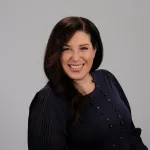
Nicole Robson is a dynamic and accomplished leader, proud of her diverse heritage as a Métis, Jamaican, Scottish, and Welsh woman. With a rich background in healthcare philanthropy, Nicole currently serves as the President and CEO of Surrey Hospitals Foundation—the largest non-government funder of healthcare in Surrey.

